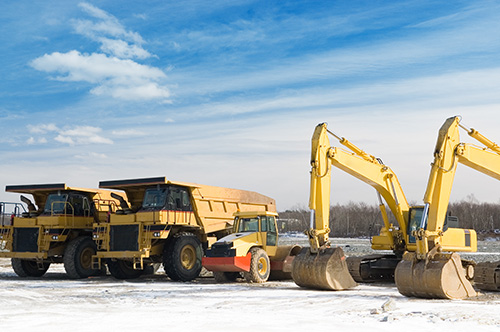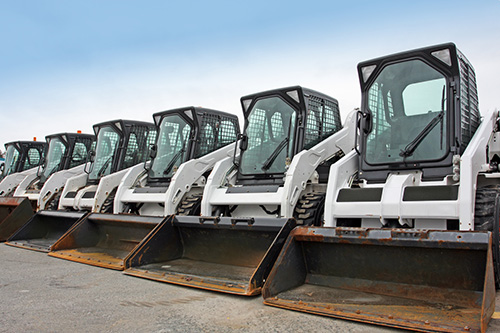More and more contractors are renting the equipment they need at the jobsite. Contractors have found that there are many opportunities to rent some of their construction equipment for jobs instead of purchasing.
Regardless of what a company decides, there are always benefits and challenges to renting versus owning construction equipment. The real answer lies in determining your specific needs for each and every project.
Matt McLean, product manager, Volvo Construction Equipment, says the economy is the main reason for the growth of the rental industry.
“Ever since the economic downturn, we’ve clearly seen the rental industry grow. Contractors have been hesitant to make a purchase and, quite frankly, our culture as a whole has become more comfortable with the idea of renting versus buying—accepting a possible higher monthly payment for the gain of flexibility and risk mitigation," McLean states.
"That could absolutely change in the future, but for now, with infrastructure funding still being speculated upon rather than finite, I think we will continue to see an upward trend in rental."
Construction Equipment Rental Considerations
With the growth of the construction equipment market, there are many options to consider when it comes to deciding whether big ticket items such as excavators, backhoes and wheel loaders, just to name a few, should be purchased or rented. The rental industry itself is constantly improving and evolving. The focus on this industry has come from the technical advancements and demand from contractors.
“Ultimately it comes down to cost and convenience,” says Liam Stannard, CTO, BigRentz. “If you're using a piece of gear all the time and have the resources and means to store and maintain it effectively, purchasing will probably save you money over time. On the other hand, if you're using the gear somewhat less frequently or don't want to maintain equipment storage locations and hire both service technicians and delivery drivers, then renting can be a great option.”
“While there are no hard-and-fast rules, the general rule of thumb most folks agree with regarding aerial equipment is one should consider purchasing aerial equipment they use more than 65 percent of the time," Stannard said. "If you're using it less frequently, rental is probably a better deal."
This is one of the reasons construction companies are experiencing an uptick in equipment rentals. Another has to do with the usage ratio of renting versus owning construction equipment.
Advantages of Renting Construction Equipment
When deciding between renting versus buying construction equipment, construction contractors should analyze the current financial capabilities of the company, the age of their current fleet, and short and long term project needs. Derek Betcher, rental marketing manager at Hitachi and John Deere, emphasizes the benefits of renting.
"Much of the decision needs to be based on the usage ratio, and that that will help a company determine whether to own versus rent," said Betcher.
Since 2002, Hitachi sales, marketing and many product support activities in the Americas have been managed by the Construction & Forestry Division of John Deere.
Still, one of the biggest benefits of renting versus owning is the fact that contractors can leverage a piece of equipment based on specific needs for a particular project.
McLean adds that a benefit lies in changing the equipment to fit your needs.
“Aside from the obvious reason of financial flexibility in renting, one advantage of buying equipment is that you can select the exact machine size you need for the job at hand. With a purchase, you’re looking to own a machine that will work across a variety of jobs and be a best match most of the time, with the knowledge it won’t always be a perfect match for the job at hand. When renting, however, you’re able to select the exact size necessary, which can then allow you to control some costs because you’re not putting more power or fuel into a job that could be tackled by a smaller machine,” McLean explains.
Another consideration is maintenance and repair of the equipment that is being used. A contractor might be able to take on a job previously unavailable to them. They now can rent the equipment and only need the knowledge of how to operate it, not the inner workings of the machine.
Hitachi’s and John Deere’s Betcher says, “If a company needs a project-specific piece or if it has a niche project, renting becomes worth it. There are a lot of variables with owning. Service, maintenance and repairs can happen at any time. When renting, the rental company becomes responsible for all that."
Contractors need to know that they shouldn’t hesitate to look into rental and that many companies want to assist them in finding the best solution to their equipment needs.
“Renting can be better than buying in instances when a contractor feels like they may be overextending themselves or overcommitting based on jobs they can forecast. On the flip side of that, however, many manufacturers are invested in helping contractors find a flexible financial offering so that they can do a true side-by-side comparison of purchasing versus renting,” McLean says.
 Technology Trends in the Equipment Rental Industry
Technology Trends in the Equipment Rental Industry
The construction rental industry has introduced a host of new technologies, from tech on the equipment itself to how contractors request a unit and where they get it.
“There are many rental companies out there and with the technology to advertise services over many mediums, it becomes an advantage to the contractor. If they want to rent through an app or in person, all options are available,” Betcher says.
Building on this, in addition to reserving a rental, construction companies can also use technology to manage the entire rental process.
Stannard points out how ease of use is a big attraction, saying it's about having a single point of contact for all their rental needs. “They can see and manage their many dozens of rentals in one spot, and see real time information about the status of each piece of equipment. It's incredibly easy to place new orders, manage historical and existing orders, handle invoices, report any issues and more through a customer portal. We use text messages and emails to keep customers and their job site workers up-to-date with equipment delivery, pickup and the like,” Stannard states.
 Using Rental Equipment to Test Drive New Technology
Using Rental Equipment to Test Drive New Technology
Certainly, the equipment rental process is changing with the help of technology, but perhaps one of the greatest benefits of renting is the fact that contractors can “test drive” some of the new and emerging technologies on a piece of equipment.
When it comes to experiencing new technology on the equipment, the experience can vary, according to McLean.
“I would say one of the things that contractors give up when they rent is the intelligence that can be gained when you own a machine and are tracking it through telematics—ways to reduce overall jobsite costs, gain productivity in your machine, track operator behavior for training opportunities that can further those productivity gains, etc. There are obviously pluses and minuses to everything, but I would recommend that a contractor consider the long-term benefit when possible when they weigh cost-benefit analysis of renting versus buying. Many manufacturers are offering telematics as part of a package with new machine purchases now, including Volvo, and the long-term value gained on a machine through this intelligence is incredibly impactful,” McLean says.
Equipment is advancing very rapidly, and contractors can leverage some of these smarter technologies on the pieces of equipment they are renting.
Betcher explains, “A contractor that is renting gets exposure to new tech on a new piece of equipment. Excavators with telematics are one example. Several players are figuring out how to utilize the tech when renting out the equipment. There is more expensive tech that can only be rented, the cost of ownership is too high. Self-diagnostics technology is helpful for the contractor. If there is a problem, they can relay what it is to the rental company. As a renter, the equipment being used just has to run. A lot of new tech is in the background, such as diagnostics, safety and tools, and they don’t experience it firsthand,” Betcher states.
With a plethora of rental options available to contractors, this industry can only grow and evolve to provide the best solutions to contractors for their projects.
Join over 32,000 industry peers who receive construction industry news and trends each week. Subscribe to CONEXPO-CON/AGG 365.









